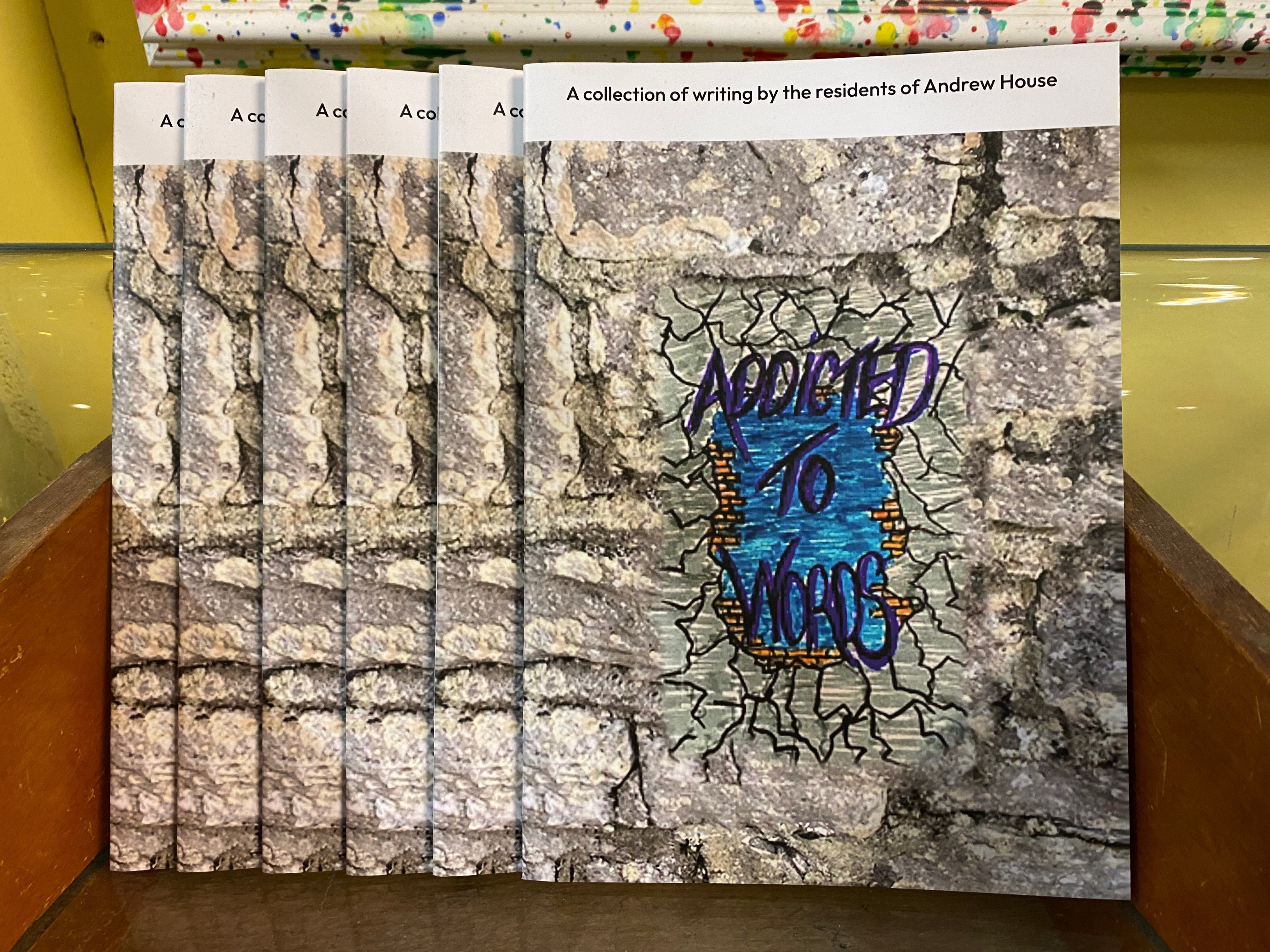I was recently fortunate enough to sit down with June (one of our Andrew House volunteers), to chat about the creative writing sessions that have resulted in the publication of ‘Addicted To Words’ – the collection of writing by residents of Andrew House. Read on for June's reflections regarding these sessions and their outcomes...
How did the creative writing sessions come about?
The creative writing sessions were very much initiated by Jess as she knew I was interested in writing. When I retired after 42 years working in the Avon and Somerset Probation Service it was an activity I was keen to pursue as I had always enjoyed writing, but was keen to do so in a more structed way, so I embarked on a series of creative writing courses.
Jess thought that this was an activity that the residents of Andrew House could benefit from so asked if I would be interested in leading some group work.
What did you hope the residents would get out of these sessions?
I think I looked at it from the point of view of opening their minds to literature and the potential power of words. Not everybody is going to be an author but everybody possesses the ability to write – if you can talk, you can express yourself with words.
We encouraged the residents to believe in themselves and give it a go as everyone would be capable of putting something down onto paper. I explained that I felt writing was both enabling and healing, as words can help you to understand what is going on and to make sense of things.
What response did you get from the residents, and did this change over time?
It was very mixed initially. Some were enthusiastic, some were more hesitant and others were quite resistant. However, reactions changed over time as I think those that were enthusiastic probably influenced others. I should say though that those who were resistant at first were never dismissive of the contribution of others – they engaged with the process and would often comment constructively.
One resident at first said he couldn’t do it but then ended up writing some beautiful love poems for his wife, which he was encouraged to share with her. On one occasion I was unable to attend and two residents actually stood in and facilitated the session, which demonstrated huge progress – to move from being a participant, to actually leading a session.
What impact do you think such an activity can have on a person’s mental health?
Being able to express your emotions in a verbal or written form can often help you make sense of things. The residents were often writing about personal trauma or stressful situations. Sometimes they used an object as a metaphor for their feelings, emotions or experiences, but bringing it out into the open can help a person to make sense of something they are working through and it can also help them to understand the changes they are making in their lives. Not expressing yourself can be very dangerous so expressing yourself through writing can be cathartic and freeing. In my experience mental health issues are often due to people not being able to express themselves or not understanding their feelings, but writing it down can help someone to make sense of their feelings and subconsciously work through their difficulties.
During feedback, some of the guys were quite perceptive and were able to see hidden meanings and deduce alternative interpretations in the writing of others.
What can you tell us about the process?
I would sometimes come up with a topic, but the sessions were very flexible and we always asked the residents for their ideas.
Peer feedback was very important and, from the start, we set ground rules whereby a resident would be asked to read an example of their writing twice and his peers would then offer positive, constructive comments. They would never criticise, but could gently ask for clarification if they were unsure of something.
What was really amazing was the level of insight they demonstrated for each other’s creative efforts, often picking up on things I hadn’t noticed. This showed that they were really listening to each other.
I encouraged the residents to share their writing on the walls at Andrew House so that visitors and new residents could read them, but then one day Jess came in to say that she had secured a grant for the poems to be collected into a printed booklet. Putting together ‘Addicted To Words’ was very much a collaborative effort, with newer residents getting involved with the artwork.
The guys also became quite used to reciting their work out loud to each other, and this then helped some of them to have the confidence to recite their poetry in church and at last year’s CLC Celebration Event, which a lot of people found incredibly moving.
What outcomes do you think have been achieved?
Obviously, the guys have produced this wonderful book of poetry and creative writing, which is testament to their willingness to take a chance and participate in something which they may not have initially thought would have been for them.
Some of them discovered a real joy for writing and demonstrated a special ability to express themselves through writing. For one resident, whose head can be like a kaleidoscope with mixed up and confused thoughts, transferring those thoughts to paper helped him to recognise this and increase his self-awareness through learning to slow down and be more focused.
I think the sessions also helped to build confidence and self-esteem in those residents who participated. Sharing their efforts and receiving positive feedback definitely aided this.




